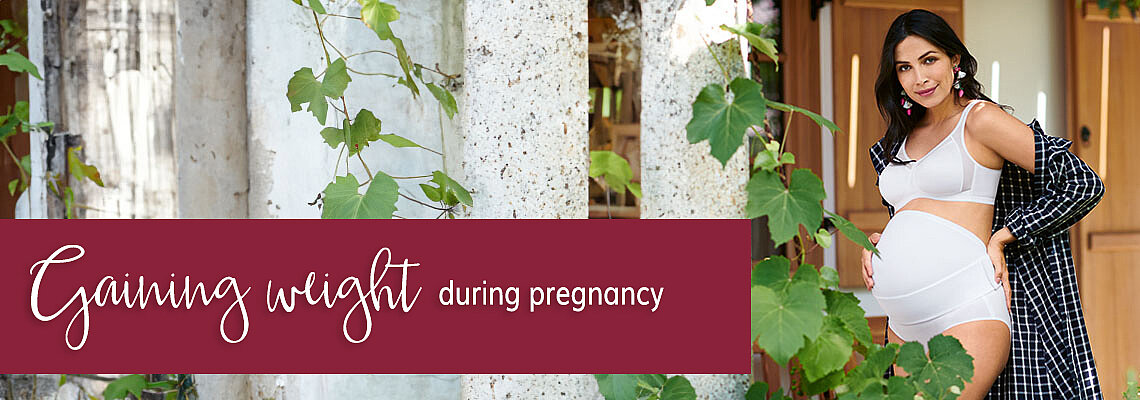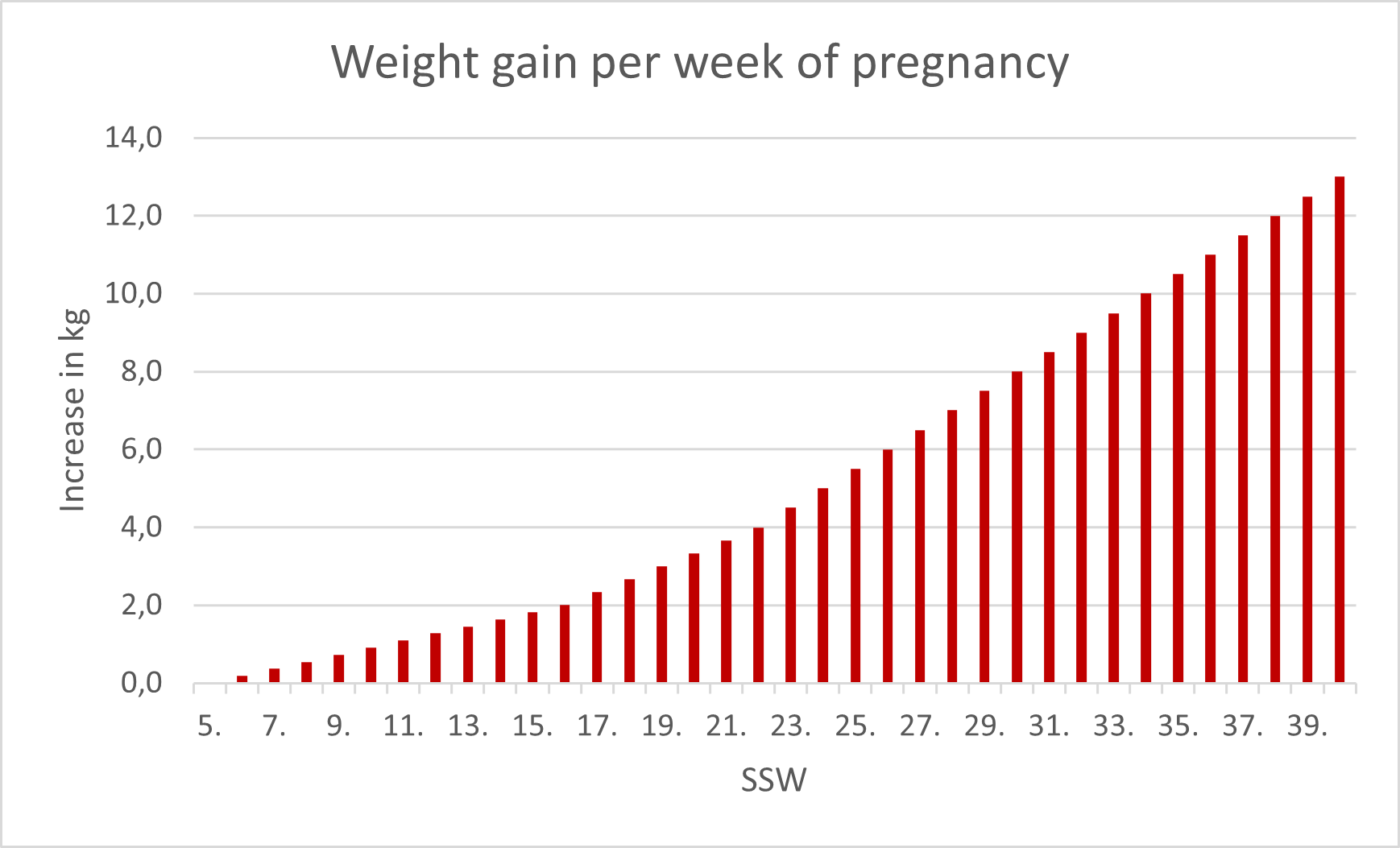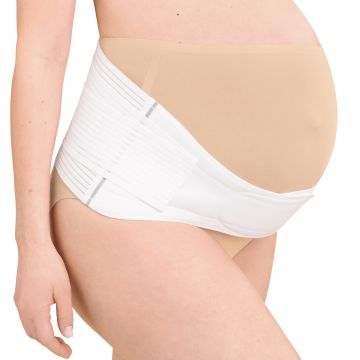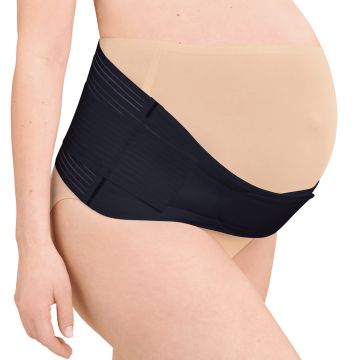Gaining weight during pregnancy: What you should know

Your pregnancy - a natural growth
Gaining weight during pregnancy is completely natural. In fact, it is necessary and reflects your body's individual journey. There is no need to worry – your body is performing the miracle of creating new life. During this special time, it's important to focus on health and well-being of you and your baby. Don't let yourself be unnecessarily influenced by the numbers on the scale. Every change you experience is part of an amazing process. This is focused on creating a safe and nurturing environment for your baby.
How much weight gain is "normal" and what actually gets heavier?
From the second trimester onwards, you should notice a steady weight gain. It even intensifies in the third trimester as your baby builds up fat reserves. Your midwife or doctor will check this at every check-up and discuss your individual weight curve with you. Don't panic if the scale shows a few extra kilos more – it's all part of the process. But be careful, if you gain more than about 1 kg or more per week, this could be a sign of illness. In this case, please seek medical attention and have this clarified.
It's not just your baby's weight that will increase over the course of your pregnancy. Towards the end of your pregnancy, this will be around 3 kg. Other factors also contribute to weight gain. The amniotic fluid surrounding your baby weighs approx. 1 kg. Water retention in your body accounts for an additional 2 to 2.5 kg. The milk comes in and increases the mammary gland tissue, contributing up to 1kg. The placenta, which supplies vital nutrients and oxygen to your baby, also weighs around 500 g. The enlarged uterus and the increasing blood volume are also responsible for some of the weight gain. Nice to know: The uterus is the largest muscle a woman has at the time of birth -> approx. 1 kg of muscle mass. The various factors responsible for weight gain are summarised in the following overview:
|
Baby in the womb |
3-4 kg |
|
Water retention |
2 – 2,5 kg |
|
Fat reserves in preparation for breastfeeding |
approx. 1.7 kg |
|
Uterus |
1,3 kg |
|
additional blood volume |
1,2 kg |
|
Amniotic fluid |
1 kg |
|
Breast enlargement (mammary gland tissue) |
0,5 kg per breast |
|
Placenta |
0,5 kg |
If your baby bump gets bigger and feels heavier every day, wearing a pregnancy belt can provide relief. It is nothing more than a belly band or belly support with built-in support for the belly. The belt relieves your muscles in the lower back and pelvic floor.
You can wear the pregnancy belt until birth. If the belly is still heavy and pulls down afterwards, the maternity belt is the ideal help until the complaints subside.
Your personal BMI
First of all, the BMI is only a tool that can help you to categorise your weight gain. It puts your weight in relation to your height. This alone says nothing about how healthy you are or whether you are overweight or underweight. Your self-esteem should never depend on your BMI, regardless of whether you are pregnant or not.
The further your pregnancy progresses, the more weight you will gain as an expectant mother. There is no standardised value for how much you can gain. It depends on your pre-pregnancy weight. The guidelines of the Federal Ministry of Health give you an individual recommendation based on your body mass index (BMI). If your values are within the normal range, then a gain of 11 to 16 kg during the entire pregnancy is normal. With a BMI of 18.5 to 24.9, you are within the normal range. For women with a BMI below 18.5, an increase of up to 18 kilograms is considered healthy. Those with a BMI over 30 should try to limit their weight gain to a maximum of 9 kg.

How is weight gain distributed during pregnancy?
Weight gain during pregnancy varies depending on the trimester. The first trimester often shows a small increase. The second and third trimesters show a steady increase as the baby grows. However, the blood volume also increases and the body stores water and fat for breastfeeding. As expected, the weight occasionally jumps, but as long as it remains within the target range, there is no cause for concern. Midwives and gynaecologists often look at the weight gain per week if you are overweight/underweight or have pre-existing conditions.
They apply the following standards:
- Hardly any weight gain before the 13th WOP
- 250g - 300g / week from the 14th to the 24th WOP:
- 400g / week from the 25th WOP
You can find an approximate guide to weight gain by week of pregnancy in our diagram. This is only a rough guide; your personal weight gain may vary greatly from this at different stages.
Your diet counts
The quality of nutrition plays a decisive role during pregnancy. The often-heard advice to "eat for two" during pregnancy is misleading. Rather, it depends on the food you eat. A rich supply of nutrients is important for your health and the development of your baby. Lots of vitamins, minerals, protein and healthy fats promote well-being and support the growth of the foetus.
Although you have a slightly higher calorie requirement during pregnancy, this is less than you might think. Experts recommend only a moderate increase in your daily calorie intake. Especially in the second and third trimester. It is important to choose high-quality foods that are rich in nutrients instead of simply eating more. Wholemeal products, fresh fruit and vegetables, lean proteins and dairy products should form the basis of your diet.
Drinking enough water is also essential to keep the body hydrated and aid digestion. The aim should be to maintain a diet that benefits your body and your growing baby. At the same time, you should not gain unnecessary weight. Ultimately, the quality of food counts far more than the quantity. Healthy, nutrient-rich foods can help to minimise pregnancy discomfort and ensure that your baby gets the best possible start.
After pregnancy
After pregnancy, patience is required when it comes to losing the extra weight. In addition to breastfeeding, which can have a supportive effect due to the increased calorie consumption, regular exercise also plays an important role. Simple exercises, walks with the pram or gentle yoga sessions can help to gradually strengthen the body and tone the muscles. A balanced, nutritious diet supports this process by providing the body with everything it needs to regenerate.
In addition, special products such as the Anita maternity RebeltPanty can have a positive influence on the recovery of the stressed tissue in the abdominal area. These recovery briefs are designed to gently support the tummy. They help to shape your figure more quickly after birth. The targeted compression not only improves your well-being. It also supports the involution of the uterus and contributes to a firmer centre of the body.
It is important to remember that every body is unique and regenerates at different rates. Instead of putting yourself under pressure, it makes more sense to listen to your body and give it the time it needs to recover from pregnancy and childbirth. The combination of a healthy lifestyle and supportive products such as the RebeltPanty can make this process easier. So that you feel comfortable and at home in your body again.
Last but not least
Remember that weight numbers are just one facet of your pregnancy. What really counts is the feeling of connection with your growing baby and the anticipation of the new life you will soon be holding in your arms.
Your pregnancy is a time of change and growth. Don't forget to enjoy it and celebrate your progress, no matter what the scales say. If you are unsure, your midwife or doctor is always available for personalised advice to help you through this exciting time. Love and care for you and your baby are the most important things now.









Comments:
No Comments